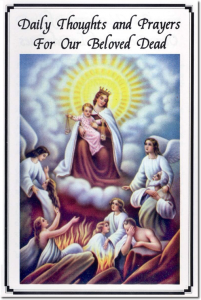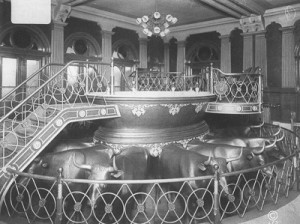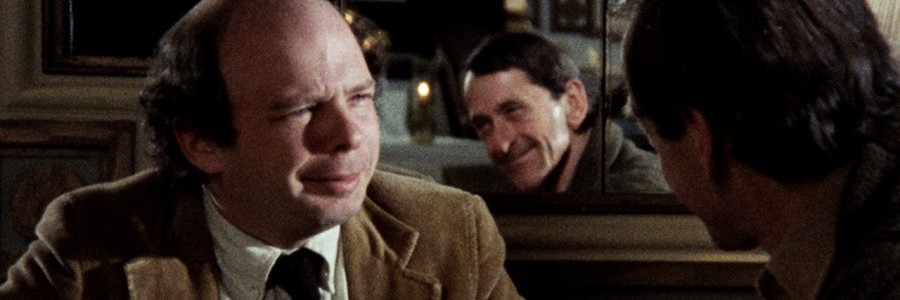O Lord, how long shall thy hand be stayed from, and thine eye behold, the wrongs of thy people and of thy servants inflicted by our much prayed for, but now regrettable … Mormon Moment?
By my calculations, The Mormon Moment began on June 12, 2011, the day “The Book of Mormon” musical won 9 Tony Awards. While earlier dates are possible for the beginning of The Mormon Moment, June 12, 2011 was, without a shadow of a doubt, the undisputed terminus ante quem. And, using my iPhone Lord’s Time Calculator App, The Mormon Moment should have lasted only 8.3 months, finishing up by the end of February 2012, so can I help it if I’m getting a little testy-moan-ial about answering so many freaking emails like this one last week from my good friend Andre (slightly edited and reformatted here to enhance coherency for the D&S readership)?
Andre : Ed, is this post-mortem baptism thing I keep reading about real?
Ed : <Sigh> Yeah. Stick with me here.
It’s called baptism for the dead. I’ve heard the best way to translate it is that it’s like you guys, my Catholic friends, saying prayers for the dead, except … on spiritual steroids. It’s not a “forced conversion” in any form–Mormons don’t believe that their baptisms on behalf of dead people automatically make those dead people zombie Mormons. It’s more like the grant of heavenly stock options in favor of the deceased that are now fully vested, just awaiting the exercise thereof by said dead people, at their discretion, and once granted, they never lapse.
How did this originate you ask? Mormons, being fairly literally minded, believe you’ve got to get baptized by proper authority in order to go to heaven (without being born of the water and the spirit you can’t enter into heaven says John somewhere). Mormons also believe that the souls of dead people are floating around somewhere awaiting the 2nd coming of Jesus, and, these levitating spirits can’t really get wet, so, how do they get baptized after they are dead if they didn’t care of business and get dunked while in the flesh? Here’s the part most people don’t understand. Mormons, being extraordinarily fair-minded and progressive for being so frequently literal in their scriptural interpretation, don’t believe that dead unbaptized people should get screwed and go to hell if they didn’t get baptized during their mortal existence, so, voila! Mormons get wet down here for them, as if using a power of attorney on earth to take care of some heavenly business.
Now, one of the little-known benefits of Mormon baptism for the dead, a windfall if you will, is that it’s completely … tithing free! To my knowledge, no Mormon teaching requires deceased Mormons to pay back-tithing, probably because floating deceased individuals don’t carry any cash. So, if tithing is the thing holding you back from embracing Mormonism, just die someday and they’ll baptize you and you’ll have saved several college degree tuitions-worth of tithing drain on your income.
 One final analogy: in light of our current national discussions, baptism for the dead is analogous to a Mormon mandated salvation-care coverage that you can opt into, if you want.
One final analogy: in light of our current national discussions, baptism for the dead is analogous to a Mormon mandated salvation-care coverage that you can opt into, if you want.
If you are a scripturally minded person, this odd LDS ritual is actually an ancient Christian practice … gone slightly awry. Paul mentions it in the New Testament. In 1st Corinthians, Paul argues in favor of belief in the resurrection of the dead against certain Corinthian Christians who denied the resurrection by saying: “Hey, of course there’s a resurrection of the dead. Think about it. Why are you Corinthian Christians baptizing yourselves on behalf of dead people if they aren’t resurrected?” So, at least some of the early Corinthian Christians were doing posthumous baptisms, but a later Catholic council put an end to all that. Yeah, looks like you guys used to do this too.
Okay, fast forward to Joseph Smith who is worried about some of his relatives who died without getting baptized. Joseph was actually a thoughtful, considerate and nice guy (unless flirting with your wife), so he felt bad about these people he thought were going to hell according to the prevailing opinion in 1830something until Joseph comes across Paul’s teachings about vicarious baptisms for the dead. Bam! Here’s how we can fix that! Joseph Smith originally intended this ritual to apply only to family members you knew who you thought would have liked this done for them. Of course, as with all good ideas, over time, somebody got carried away and said, “why don’t we just vicariously baptize ourselves for every person who ever lived in order to give everyone celestial vesting stock options/heavenly healthcare coverage?”
So, today, as a result, the (admittedly ambitious) Mormon idea of helping out all baptism-challenged dead people who ever lived required that Mormons create and maintain the most exhaustive genealogical database EVER in order to identify and keep track of the dunked and the non-dunked. And, in their generosity, these industrious, zealous and well-intentioned Mormons made this info available to the public. This act of generosity enabled millions of non-Mormons to happily discover their ancestry using the Mormon-collected data and then to become not so happily offended when they learned that Mormons are baptizing those very same dead relatives the Mormons introduced them to.
Andre : All hail Planet Kolob.
;

Brilliant.
My favorite part:
I think this might be my favoritest D&S post ever.
Zombie Mormons FTW!!
My favorite, too, Paula. I especially enjoyed this paragraph:
“Now, one of the little-known benefits of Mormon baptism for the dead, a windfall if you will, is that it’s completely . . . tithing free! To my knowledge, no Mormon teaching requires deceased Mormons to pay back-tithing, probably because floating deceased individuals don’t carry any cash. So, if tithing is the thing holding you back from embracing Mormonism, just die someday and they’ll baptize you and you’ll have saved several college degree tuitions-worth of tithing drain on your income.”
Fun post. I have a question, though. I usually explain to my non-Mormon friends that Mormons believe in universal salvation–that, because of Christ’s atonement, nearly everyone will be saved in the traditional Christian sense. What baptism and other ordinances–for the living or the dead–make possible is access to higher levels of heaven, if you will. It’s like the difference between the rear balcony and the orchestra. Or, perhaps more apt, first class, business class and coach, where those in first class can visit those in business class and coach, but those in coach can’t wander up to first or business class. While I know most Mormons wouldn’t use the term “universal salvation,” is this your sense of Mormon doctrine? I haven’t heard it talked about much lately, particularly in discussions of this kind where it might be helpful.
Lorie, good question, and I think generally speaking you are correct. And, I like the balcony/orchestra analogy a lot! Here’s my take on it.
Curiously enough, when the Book of Mormon came out, it was recognized by many, including early Mormons themselves, as an “anti-universalist” book of scripture. The earliest reading guide to the BoM, produced by Mormons for Mormons, labels several passages and characters as “anti-universalist.” Dan Vogel’s introduction to this topic can be read here: http://signaturebookslibrary.org/?p=10117
Then, Joseph Smith and Sidney Rigdon later receive Section 76 of the D&C which is, as you point out, at least universalist-lite, and the related doctrines that followed made hell/outer darkness a place for just a few spectacular sinners. This caused some early Mormons to scratch their heads. Says Vogel:
“It was perhaps the strong anti-Universalist stance of the Book of Mormon which accounts for some of the adverse reactions Smith received in response to his February 1832 vision of the three degrees of glory. While working on the revision of the New Testament, Smith and Sidney Rigdon received a vision which explained that all but a few would be assigned to one of three heavens depending on their performance in mortality (D&C 76). The revelation reads in part: “And this is the gospel the glad tidings, . . . that he came into the world, even Jesus, to be crucified for the world, and to bear the sins of the world, and to sanctify the world, and to cleanse it from all unrighteousness; that through him all might be saved whom the Father had put into his power and made by him; who glorifies the Father, and saves all the works of his hands, except those sons of perdition who deny the Son after the Father has revealed him” (vv. 40-43). This revelation was easily recognized as a modified Restorationist position and to some appeared to be a major reversal in doctrine. Not surprisingly therefore, Smith received some immediate resistance to the new doctrine from within the Mormon community.”
Of course, there’s always a spoil sport who will say that going to the Telestial Kingdom will be a kind of hell since you’ll always be tormented by what might have been. Why ruin such a progressive point of Mormon teachings? This attitude ignores the strand of Mormon thinking that says a person can progress from kingdom to kingdom (not just inside a kingdom–again, more spoil sports!), a point debated by numerous GAs with differences of opinions (see this nice little summary of this topic here, by Gary Bergera (scroll down to the second note at this link): https://dialoguejournal.com/wp-content/uploads/sbi/articles/Dialogue_V15N01_180.pdf).
Thanks, Ed. I’d forgotten about Gary’s “Grey Matters” piece on what I used to call “kingdom hopping”–another Mormon idea I thought to be progressive in my more active days.